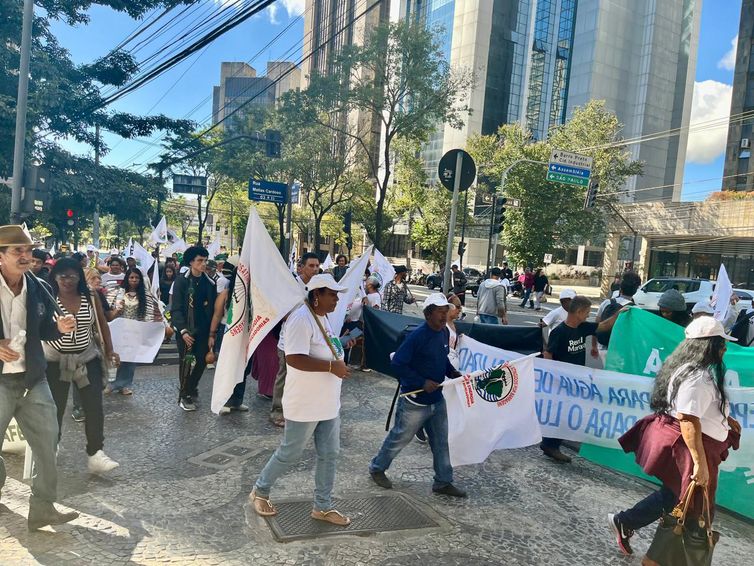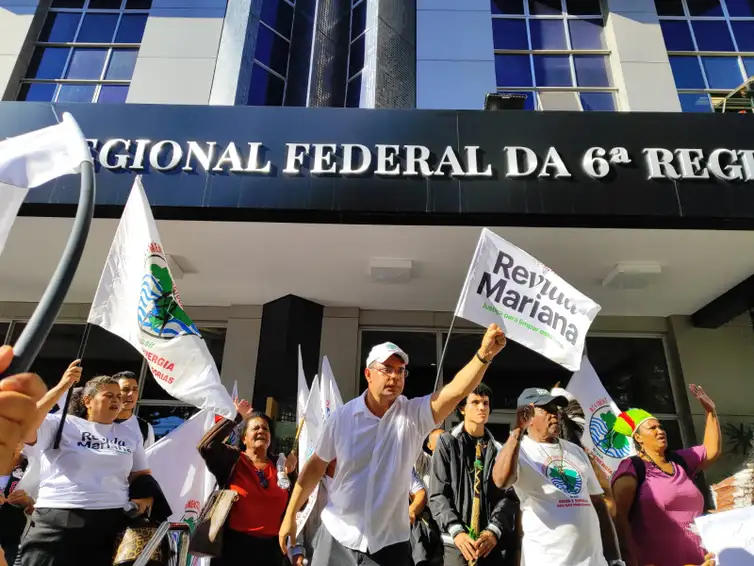Table of Contents
Affected by the collapse of the mining company Samarco’s dam, they held a demonstration this Monday (17) in Belo Horizonte where they demanded participation in the negotiations involving the renegotiation of the repair agreement. Protesters criticized the conduct of negotiations under secrecy, without the presence of entities representing the impacted communities.
A note distributed by the Movement of People Affected by Dams (MAB) provides an assessment by the member of the entity’s national coordination, Thiago Alves. “We have been monitoring the situation for almost 9 years. We are well aware of the damage caused and the developments that will continue to impact the lives of those affected. Neither the values nor the way this agreement is being constructed will resolve the situation.”
The mobilization of those affected began at 8 am in front of the building of the Federal Regional Court of the 6th Region (TRF-6), responsible for mediating negotiations on the new agreement. Afterwards, those affected went to the regional headquarters of the Brazilian Institute of the Environment and Renewable Natural Resources (Ibama), a body that monitors ongoing reparation actions. They are also mobilizing to participate in a public hearing at the Legislative Assembly of Minas Gerais (ALMG) throughout the afternoon, in which the difficulties involving water supply in the middle Rio Doce region will be discussed.
The collapse of the Samarco dam, located in the municipality of Mariana (MG), occurred on November 5, 2015. At the time, around 39 million cubic meters of waste flowed through the Rio Doce Basin. Nineteen people died and there were impacts on the populations of dozens of municipalities up to the mouth of Espírito Santo.
In March 2016, Samarco, its shareholders Vale and BHP Billiton, the Union and the Minas Gerais and Espírito Santo governments signed a Transaction and Conduct Adjustment Term (TTAC) establishing a series of reparatory actions. The document deals with various issues such as individual compensation, reconstruction of destroyed communities, environmental recovery, support for rural producers, etc.
All measures are conducted by the Renova Foundation, created based on the agreement. Mining companies are responsible for appointing the majority of members in the entity’s governance structure. It is also up to them to guarantee the necessary resources.
Eight years and seven months after the episode, there are still several unresolved problems. More than 85 thousand cases are being processed in the Brazilian Judiciary, including public civil actions, collective and individual actions. In search of a solution, negotiations to renegotiate the agreement have been going on for more than two years.
In recent months, different proposals have been presented by the parties. The last of these had values released by the mining company Vale in a statement to the market released on Wednesday (12). The mining companies proposed to allocate an additional R$82 billion in cash, an amount that would be transferred to the federal government, the governments of Minas Gerais and Espírito Santo and the municipalities over 20 years.
Another R$21 billion would be invested through actions to be developed by Samarco or its shareholders. The mining companies claim to have already invested R$37 billion in the process since the tragedy. Therefore, they claim that the proposal presented guarantees R$140 billion for reparations.
In the statement to the market, Vale states that it is committed to repair and compensation actions related to the collapse of the Samarco dam. “The new proposal is an effort to reach a mutually beneficial resolution for all parties, especially for the people, communities and environment impacted, while creating definition and legal certainty for companies”, says the text.
The values of the mining companies’ new offer advance in relation to the previous one they presented in April. There would be an additional R$10 billion in cash transfers and another R$3 billion involving the costs of measures to be implemented by Samarco itself.
The Union and the governments of Minas Gerais and Espírito Santo say they are analyzing this latest offer. They even severely criticized the mining companies’ previous proposals. The Public Ministry of Minas Gerais (MPMG) and the Federal Public Ministry (MPF) are also part of the negotiations and have aligned themselves with the governments.
The original request from the Union and the two states was R$126 billion, without including any amount already spent by mining companies. They also do not agree that part of the value involves actions to be developed by mining companies. At the beginning of the month, they agreed to lower the value to R$ 109 billionwith payments over 12 years.
Governments also want to leave out of the values some obligations under the responsibility of mining companies, such as the removal of tailings from the Rio Doce. At the end of last year, the parties stated that there was already a consensus around all clauses of the agreement. However, when they refused the last proposal from Samarco and its shareholders, the Union and the Espírito Santo government pointed out a setback on issues that had already been agreed upon.
Court lawsuits
In parallel with the negotiations for a new agreement, the Union is trying to execute a court decision from January this year that ordered the mining companies to pay R$47.6 billion to repair the collective moral damages caused by the dam collapse. This is a process in which different justice institutions led by the MPF have been requesting since last year that part of the requests made in public civil actions seeking compensation be judged. The expectation was that there would be a final decision at least on certain issues, including compensation.
The Federal Court partially accepted the arguments and condemned the mining companies, who appealed the decision. A first attempt to block resources It has already been denied by the Court, which considered the need to wait for the appeals to be processed. The Federal Attorney General’s Office (AGU) presented a new statement to the process this Friday (14), with the aim of guaranteeing the blockade. According to the agency, in values updated since the tragedy, the sentence is already R$79.6 billion.
“We cannot wait another decade. The provisional execution of the title is urgent, as the environment and the people affected need urgent repairs and those causing the damage cannot remain in a comfortable situation, acting in a way that procrastinates the processes and is held responsible for the effects of their actions”, emphasizes AGU in the new movement.




